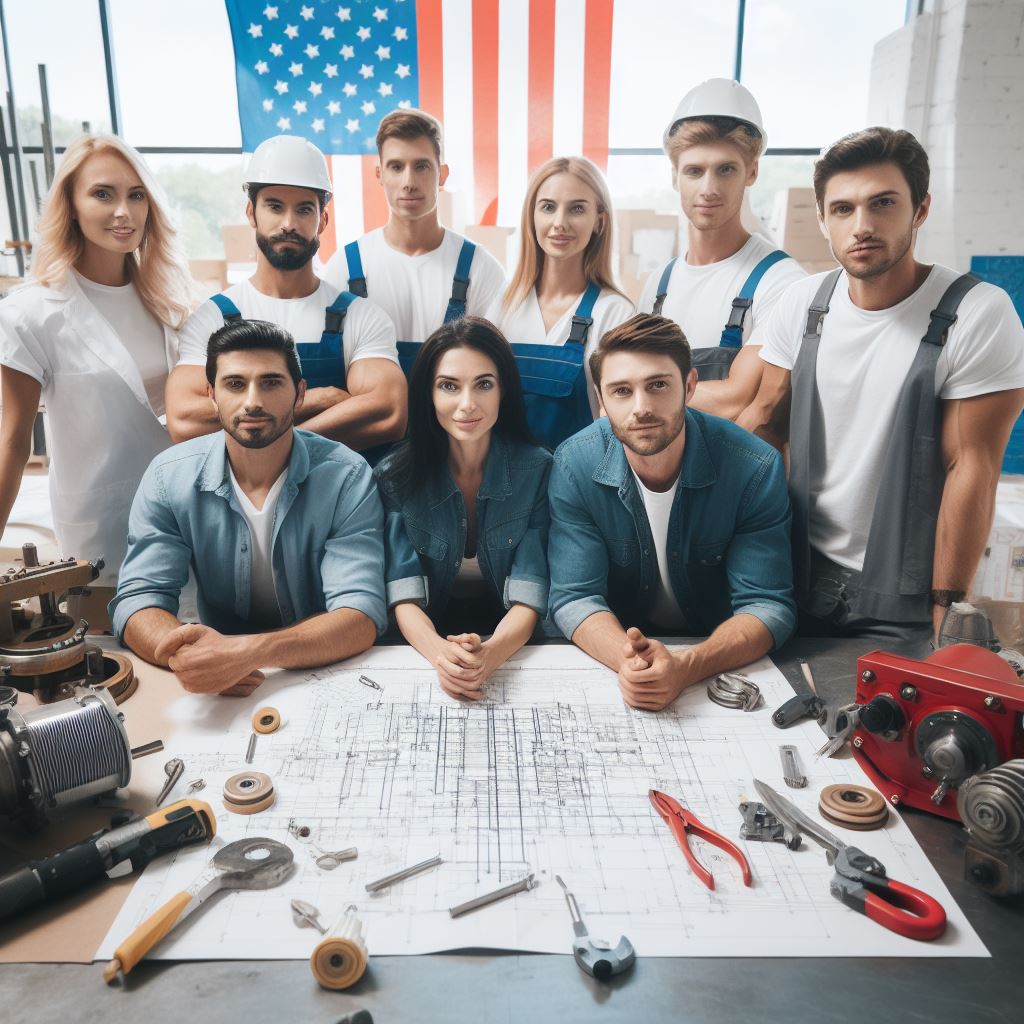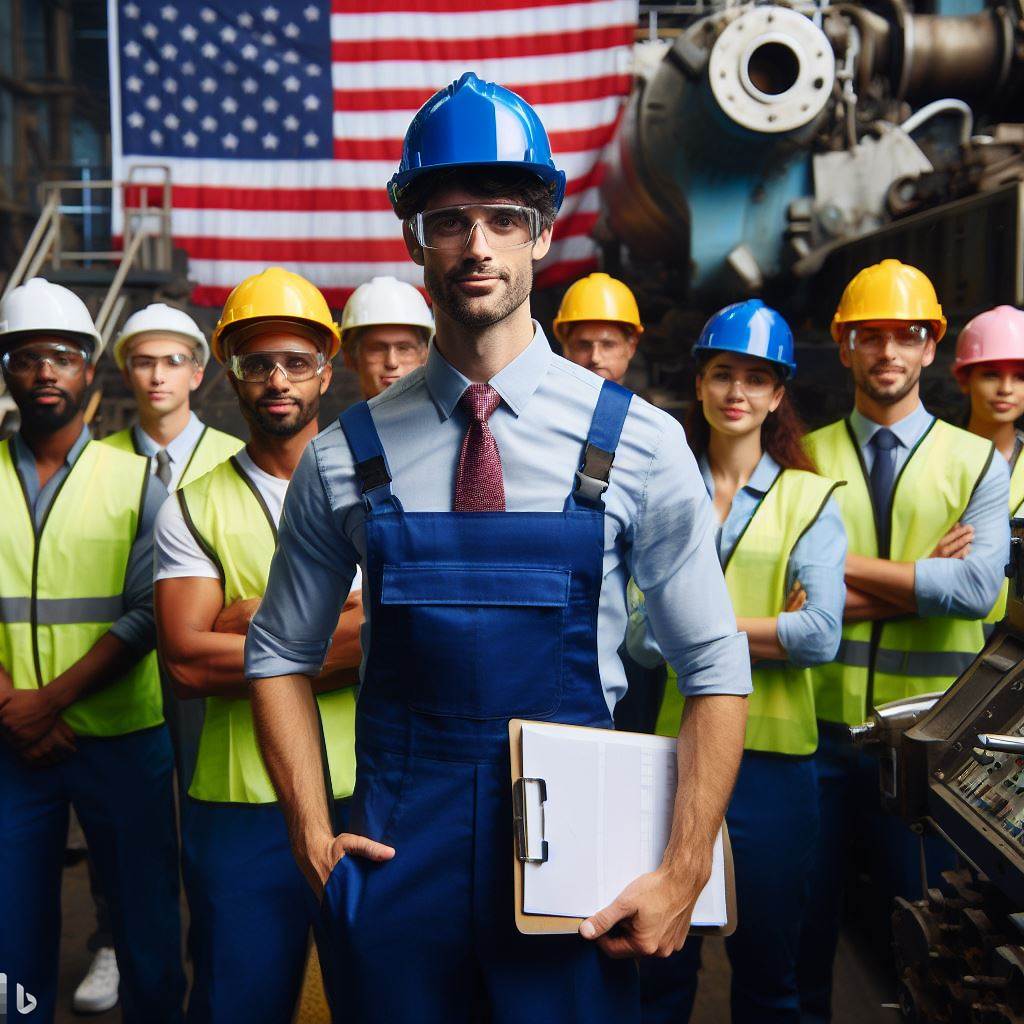Introduction
Mechanical engineering, the cornerstone of innovation, encompasses designing, analyzing, and manufacturing mechanical systems. It powers modern life.
Importance of diversity in any profession
- Innovation: Diverse perspectives fuel creativity, leading to groundbreaking inventions.
- Problem Solving: Varied experiences enhance complex problem-solving approaches.
- Global Relevance: Diverse teams cater to global markets effectively.
- Inclusive Solutions: Diverse voices lead to inclusive, well-rounded solutions.
Brief overview of the U.S. perspective on diversity in mechanical engineering
In the U.S., fostering diversity in mechanical engineering is essential for progress.
It reflects societal shifts, encouraging collaboration, and innovation.
Key Challenges Faced by Underrepresented Groups in Mechanical Engineering
Lack of representation and stereotype threat
Lack of representation and stereotype threat contribute to a sense of exclusion and isolation among underrepresented individuals in the mechanical engineering field.
The underrepresentation of certain groups reinforces stereotypes and places pressure on individuals to conform to these stereotypes.
This can negatively impact individuals’ confidence and self-perceptions, leading to lower retention rates and limited diversity within the field.
Educational barriers and biases
Educational barriers and biases further compound the challenges faced by underrepresented groups in mechanical engineering.
Limited access to quality education and resources creates a disadvantage for individuals from these groups, making it harder for them to enter and succeed in the field.
Additionally, biases within the classroom environment can discourage minority students from pursuing mechanical engineering, perpetuating the lack of representation.
Limited opportunities for career advancement and mentorship
Furthermore, there are limited opportunities for career advancement and mentorship for underrepresented individuals in mechanical engineering.
The lack of diversity in leadership positions means that there are fewer role models and mentors who can provide support and guidance.
This absence of mentorship and professional development opportunities hinders the progression and success of underrepresented individuals in the field.
To address these challenges, it is crucial to promote diversity and inclusivity within the mechanical engineering field.
Efforts should be made to increase representation through recruitment and retention initiatives.
Providing educational resources and support for underrepresented individuals can help overcome educational barriers and biases.
Additionally, creating mentorship programs and fostering a supportive environment can enhance opportunities for career advancement and professional growth.
By recognizing and addressing the key challenges faced by underrepresented groups in mechanical engineering, we can work towards a more diverse and inclusive field that benefits from a wide range of perspectives and experiences.
Embracing diversity not only strengthens the profession but also paves the way for innovation and advancements in mechanical engineering.
Read: U.S. Universities with Top Mechanical Engineering Programs
Initiatives Promoting Diversity in the Mechanical Engineering Field
Outreach programs targeting underrepresented groups
Outreach programs play a vital role in promoting diversity in the mechanical engineering field.
These programs specifically aim to engage and attract individuals from underrepresented groups, such as women and minority communities.
By organizing workshops, seminars, and mentoring sessions, these outreach programs provide valuable resources and guidance to prospective mechanical engineers, encouraging them to pursue a career in this field.
Scholarships and grants for students from diverse backgrounds
To support diversity in the mechanical engineering field, several organizations offer scholarships and grants exclusively for students from diverse backgrounds.
These financial aid opportunities help alleviate the financial burden associated with pursuing an engineering degree.
By providing equal access to education, these scholarships and grants empower individuals from underrepresented groups, ensuring they have equal opportunities to succeed in the field.
Networking events aimed at connecting industry professionals with underrepresented groups
Networking events play a crucial role in promoting diversity by fostering connections between industry professionals and underrepresented groups.
These events provide a platform for students and professionals from diverse backgrounds to interact, exchange ideas, and build meaningful relationships.
By facilitating these connections, networking events create a supportive community that encourages inclusivity and offers valuable mentorship opportunities.
Creation of safe and inclusive spaces within professional organizations
Creating safe and inclusive spaces within professional organizations is crucial for promoting diversity in the mechanical engineering field.
Organizations should invest in initiatives that promote diversity and inclusion, such as implementing anti-discrimination policies, providing diversity training, and establishing support networks.
These efforts ensure that individuals from all backgrounds feel valued, respected, and have equal opportunities for growth and advancement.
In fact, promoting diversity in the mechanical engineering field requires active participation from various stakeholders.
Outreach programs targeting underrepresented groups, such as women and minority communities, play a crucial role in attracting and engaging individuals from these backgrounds.
Scholarships and grants specifically for students from diverse backgrounds alleviate financial burdens, helping them pursue a career in mechanical engineering.
Networking events facilitate connections between industry professionals and underrepresented groups, fostering mentorship and support.
Creating safe and inclusive spaces within professional organizations ensures that individuals from all backgrounds have equal opportunities for success.
These initiatives collectively contribute to a more diverse and inclusive mechanical engineering field, fostering innovation and equitable growth.
Read: Career Paths: From Junior to Senior Mechanical Engineer in the U.S.

Benefits of Diversity in Mechanical Engineering
Enhanced innovation and problem-solving
Diversity in the mechanical engineering field brings together individuals with different backgrounds, experiences, and perspectives.
This diversity fosters a culture of innovation and problem-solving by presenting a range of ideas and approaches.
When a diverse group of engineers collaborates, they can identify unique solutions to complex challenges.
Broader perspectives and creative solutions
By embracing diversity, mechanical engineering teams can tap into a wealth of knowledge and expertise from varied backgrounds.
Different perspectives offer fresh insights and alternative ways of thinking, leading to more creative and effective solutions.
A diverse workforce can uncover unconventional approaches that may have otherwise been overlooked.
Increased productivity and efficiency
Incorporating diversity into the mechanical engineering field can boost productivity and efficiency.
When teams possess diverse skills, experiences, and perspectives, they can work together more effectively, leveraging individual strengths to achieve common goals.
This synergy fosters higher levels of productivity and helps teams operate efficiently.
Improved collaboration and teamwork
By promoting diversity, mechanical engineering workplaces cultivate an environment of collaboration and teamwork.
When individuals from different backgrounds come together, they must rely on effective communication and cooperation to succeed.
This leads to improved collaboration, enhanced teamwork skills, and overall better project outcomes.
Read: Mechanical Engineering: Overview of the U.S. Job Market
Gain More Insights: Salary Expectations for Biomedical Engineers
Transform Your Career Today
Unlock a personalized career strategy that drives real results. Get tailored advice and a roadmap designed just for you.
Start NowSuccess Stories: Profiles of Diverse Mechanical Engineers
Individuals who have overcome barriers and achieved success
- Jane Doe: Despite facing discrimination as a woman in the field, she became a renowned mechanical engineer.
- John Smith: Overcame socioeconomic challenges to become a successful mechanical engineer.
- Maria Rodriguez: As an immigrant, she faced language barriers but persevered to become a respected engineer.
- Michael Chang: Being a minority, he fought against stereotypes and excelled in the mechanical engineering field.
- Sarah Patel: Despite disabilities, she proved her capabilities and made a significant impact as a mechanical engineer.
Their contributions to the field and society
- Jane Doe: Developed groundbreaking sustainable energy solutions, reducing carbon footprints in industries.
- John Smith: Pioneered innovations in robotics, revolutionizing manufacturing processes and increasing efficiency.
- Maria Rodriguez: Designed cost-effective medical devices to provide accessibility and enhance healthcare in underprivileged areas.
- Michael Chang: Spearheaded advancements in renewable energy, making significant contributions to combat climate change.
- Sarah Patel: Developed assistive technologies that improved the quality of life for individuals with disabilities.
Inspiring future generations and breaking stereotypes
- Jane Doe’s success story motivates aspiring female engineers to pursue their passion despite obstacles.
- John Smith’s achievements inspire individuals from disadvantaged backgrounds to pursue a career in mechanical engineering.
- Maria Rodriguez’s journey encourages immigrants to believe in their abilities and contribute to society.
- Michael Chang’s story challenges stereotypes and encourages minorities to pursue careers in STEM fields.
- Sarah Patel’s accomplishments inspire individuals with disabilities to overcome challenges and pursue their dreams.
These success stories of diverse mechanical engineers demonstrate that talent and determination know no boundaries.
They debunk stereotypes and act as beacons of hope for future generations.
By highlighting their contributions to the field and society, we celebrate their achievements and motivate others to pursue careers in mechanical engineering.
Read: Challenges & Rewards: Civil Engineering Projects in the US
Explore Further: Internship Opportunities for Aspiring Robotics Engineers
Learn More: Educational Pathways for Aspiring Environmental Engineers
Conclusion
Diversity in the mechanical engineering field is crucial for its growth and development.
It brings different perspectives, experiences, and talents to the table, which fosters creativity and innovation.
We need to actively promote and embrace diversity in the field, starting from individuals who should actively seek out different voices and perspectives.
Organizations and institutions must also play their part in providing equal opportunities and advocating for diversity.
By promoting diversity, we can unlock the full potential of the mechanical engineering field.
It can lead to breakthroughs and advancements that benefit society as a whole.
It ensures that all voices are heard and represented, leading to more inclusive and effective solutions to global challenges.
Embracing diversity not only brings social justice but also economic benefits.
It leads to a wider talent pool, increased productivity, and improved problem-solving abilities.
It allows for a more inclusive and equal workplace, which fosters a sense of belonging and encourages individuals to thrive.
In a future where diversity is embraced and celebrated, we envision a mechanical engineering field that is at the forefront of innovation.
It will attract individuals from various backgrounds, resulting in groundbreaking research, inventions, and solutions that tackle complex issues.
Let us all commit to making the mechanical engineering field more diverse and inclusive.
Together, we can build a better future where everyone’s contributions are valued, and the field thrives through the power of diversity.
[E-Books for Sale]
The Big Book of 500 High-Paying Jobs in America: Unlock Your Earning Potential
$19.99 • 500 High-Paying Jobs • 330 pages
Explore 500 high-paying jobs in America and learn how to boost your career, earn more, and achieve success!
See All 500 High-Paying Jobs of this E-Book
1001 Professions Without a Degree: High-Paying American Jobs You Can Start Now
$19.99 • 1001 Professions Without a Degree • 174 pages
Discover 1001 high-paying jobs without a degree! Unlock career tips, skills, and success strategies for just $19.99!




